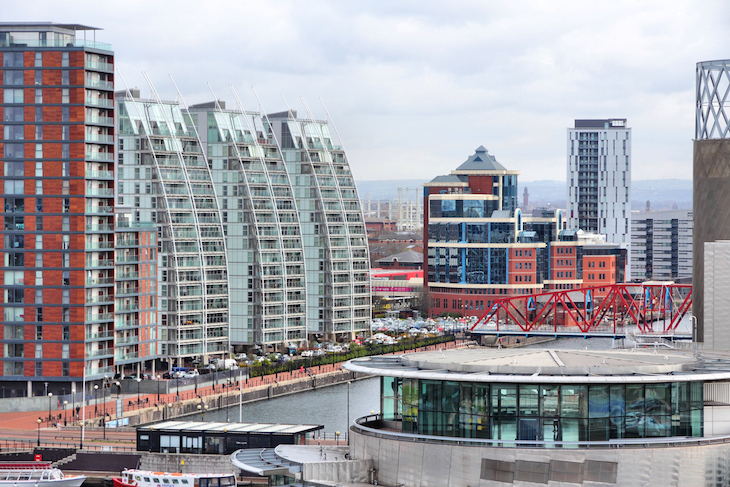Numerous readers told me they liked my recent tale — offered as an antidote to ‘media sniping at corporate capitalism’ — about the temporary school built by Porta-kabin after the Grenfell Tower fire. I’m on the lookout for other business stories that celebrate the positive, and I had it in mind to write about an entrepreneur I’ve known throughout his career who has built an international brand that pleases customers, creates skilled jobs and has carried him through tough times to a fortune. But when we spoke, our conversation took an unexpected turn. Did I realise, he asked, how he and his cohort are beginning to think in relation to the risk of an incoming Corbyn-McDonnell government?
He then sent me a list of topics currently under discussion in his office, adding: ‘I hasten to add no decisions have been taken, but I gather we’re not alone.’ Here are some of them: ‘Move personal as well as corporate assets overseas. Consider emigration to lower tax environment. Change strategy to make little or no profit in UK. Cancel all UK investment plans. Set up EU subsidiary. Investigate sale of business or generally put business into hibernation.’
Against each one, a second column notes its potential ‘big impact’ on UK employment, tax revenues and the balance of payments. This is for real, from the desk of a battle-hardened, hands-on business builder rather than some CBI waffler or callow Conservative speechwriter. What more need I say? We have been warned.
Exchange of hostilities
In How To Be Topp, Geoffrey Willans’s still-funny ‘guide to suksess’ for 1950s prep school boys, there’s a drawing by the great Ronald Searle of a line of Roman soldiers stabbing each other front and back with their famous short swords, the man at the head of the column looking particularly unhappy. Something similar seems to be going on at the London Stock Exchange.
Here’s the story so far. Last month the LSE announced that chief executive Xavier Rolet, who is French and has been in post for eight years, will retire next year, at 58. Rolet has a good reputation, having reinforced the LSE’s global status and presided over a nine-fold rise in its own share price. But it’s known that he would have stood down if last year’s proposed merger with Deutsche Börse had completed (it was blocked by Brussels) and that he was dismayed by the Brexit vote. So the idea that he might move on in 2018 is not immediately sinister, even if it coincides both with rising fears that the City will lose while Frankfurt gains from a chaotic Brexit, and with a rocky patch in which the LSE has (so far) failed to win the listing mandate for Saudi Aramco and has seen at least three other flotations pulled because of market jitters.
One LSE shareholder smelled a rat, however. He is Sir Chris Hohn, the hedge fund manager whose Children’s Investment Fund holds 5 per cent of the LSE’s shares. He accused 72-year-old LSE chairman Donald Brydon of forcing Rolet out — to which the LSE responded in legalistic terms that it ‘has followed a proper governance process to plan an orderly succession’, thereby adding fuel to the suspicions. Hohn has now called for an extraordinary meeting of LSE shareholders to oust Brydon and offer Rolet a new contract. LSE non-executive directors have let it be known they support Brydon and will go if he goes, while other institutional shareholders may back Hohn. Rolet, bound by a confidentiality agreement, has said nothing other than an obviously PR-drafted statement that ‘I am extremely proud of all we have done together…’
No smoke without fire, you’re thinking, and so am I. If Rolet is content to leave, or has another job in sight, we’d have heard by now. Brydon — a former City colleague of mine for whom I have high respect — looks uncomfortably besieged. And whatever the rights and wrongs, the LSE is engulfed in a crisis of its own making at a moment when it most needs to look self-confident and world-conquering. Watch this space.
Streetwise
I took my search for upbeat corporate parables in another direction — to Coronation Street. I’ve often dreamed of appearing in Britain’s greatest soap, though perhaps not as a character who might be swiftly despatched in the current serial-killer plotline. Last week I came as close as I’ll get, on a tour of the permanent set that replicates a Salford terraced street. There I observed (as I have before) that even in this hugely successful commercial production, capitalism is casually associated with wickedness: the street’s biggest employer, notorious for the misdealings of successive shareholders, is a knicker factory called Underworld.
More positively, however, this memorial site of popular culture occupies part of MediaCityUK, a remarkable regeneration of the Manchester docklands that fell into dereliction 30 years ago. Housed in the 200-acre waterside estate — a funkier, more human-scale version of London’s Canary Wharf — are large parts of the BBC and ITV alongside a multiplicity of digital and creative ventures, as well as the university of Salford. Some 20,000 jobs with 21st century skills have been created in an area that once employed 5,000 heavily unionised dockers, and more expansion is planned.
Corrie’s producers really ought to celebrate their flourishing neighbourhood by letting Underworld burn down (arson, obviously) and replacing it with a hipster-run tech-incubator that nurtures software ‘unicorns’. Over on the BBC side of the piazza, however, investigative reporters are more likely to be focusing on the fashionable topics of tax avoidance and business links with unsavoury regimes — having lit upon the fact that the company behind Media-CityUK, Peel Group, is majority-owned by billionaire John Whittaker who resides in the Isle of Man, while a minority stake is held by Olayan Group of Saudi Arabia. So if there’s a moral to my Corrie episode it must be, as the soaps teach us, that there’s light and dark in all the best stories.
Got something to add? Join the discussion and comment below.
Get 10 issues for just $10
Subscribe to The Spectator Australia today for the next 10 magazine issues, plus full online access, for just $10.
You might disagree with half of it, but you’ll enjoy reading all of it. Try your first month for free, then just $2 a week for the remainder of your first year.















Comments
Don't miss out
Join the conversation with other Spectator Australia readers. Subscribe to leave a comment.
SUBSCRIBEAlready a subscriber? Log in